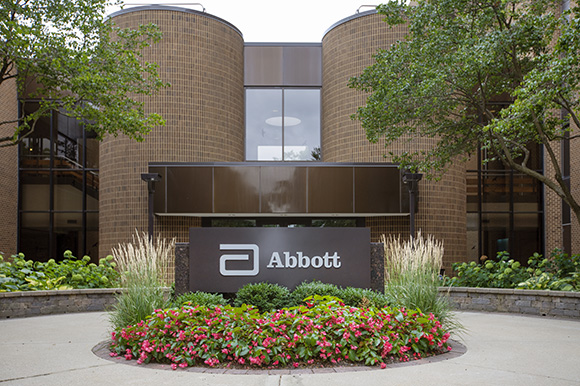
Abbott Headquarters
An unpublished study indicates that a rapid test for Covid-19 may be producing a high rate of false-negative results, according to a news report.
NPR reported Tuesday that the study, led by by Cleveland Clinic pathologist and head of the medical center’s Covid-19 testing efforts Dr. Gary Procop, indicated that Abbott’s ID NOW test only detected the SARS-CoV-2 virus in 85.2% of samples that were known to be positive. Procop told NPR that tests should have at least 95% reliability. The study has not yet been peer-reviewed.
Shares of Abbott, headquartered near Chicago, fell 4% on the New York Stock Exchange Tuesday morning following the news, which went online before markets opened.
Abbott said in its response to NPR that samples should be fed directly to the testing machine, not stored in a solution known as viral transport media. Abbott had recently told users to insert swabs directly into the device, and Procop said that the samples in his study had been stored in viral transport media. However he also said the diagnostics maker should provide data to demonstrate that such storage could affect its accuracy. He pointed out that tests made by other companies, like Roche and Cepheid, produce more reliable results than the Abbott test did in his study.
Abbott received an emergency use authorization from the Food and Drug Administration last month and was touted as being able to produce results in as little as 13 minutes while also being suitable for smaller settings like walk-in clinics. However, the devices reportedly have limited availability. The test uses isothermal nucleic acid amplification, compared with the more common reverse transcription-polymerase chain reaction (RT-PCR) and antibody-based methods used by other tests.
Still, another study that also has not yet undergone peer review indicated that false negatives could be a problem with RT-PCR tests. That study, by researchers in Europe, consisted of a review of existing literature – five studies that enlisted 957 patients. While the study found that the evidence collected came with several limitations like a risk of bias, high degree of heterogeneity and concerns about applicability, the findings showed that up to 29% of patients could have initial RT-PCR results that are false negatives and thus “reinforce the need for repeated testing in patients with suspicion of SARS-CoV-2 infection.”

A Deep-dive Into Specialty Pharma
A specialty drug is a class of prescription medications used to treat complex, chronic or rare medical conditions. Although this classification was originally intended to define the treatment of rare, also termed “orphan” diseases, affecting fewer than 200,000 people in the US, more recently, specialty drugs have emerged as the cornerstone of treatment for chronic and complex diseases such as cancer, autoimmune conditions, diabetes, hepatitis C, and HIV/AIDS.
Photo: Abbott












